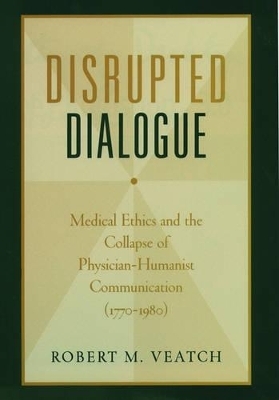
Disrupted Dialogue
Oxford University Press Inc (Verlag)
978-0-19-516976-8 (ISBN)
Medical ethics changed dramatically in the past 30 years because physicians and humanists actively engaged each other in discussions that sometimes led to confrontation and controversy, but usually have improved the quality of medical decision-making. Before then medical ethics had been isolated for almost two centuries from the larger philosophical, social, and religious controversies of the time. There was, however, an earlier period where leaders in medicine and in the humanities worked closely together and both fields were richer for it.
This volume begins with the 18th century Scottish Enlightenment when professors of medicine such as John Gregory, Edward Percival, and the American, Benjamin Rush, were close friends of philosophers like David Hume, Adam Smith, and Thomas Reid. They continually exchanged views on matters of ethics with each other in print, at meetings of elite intellectual groups, and at the dinner table. Then something happened, physicians and humanists quit talking with each other. In searching for the causes of the collapse, this book identifies shifts in the social class of physicians, developments in medical science, and changes in the patterns of medical education. Only in the past three decades has the dialogue resumed as physicians turned to humanists for help just when humanists wanted their work to be relevant to real-life social problems. Again, the book asks why, finding answers in the shift from acute to chronic disease as the dominant pattern of illness, the social rights revolution of the 1960's, and the increasing dissonance between physician ethics and ethics outside medicine. The book tells the critical story of how the breakdown in communication between physicians and humanists occurred and how it was repaired when new developments in medicine together with a social revolution forced the leaders of these two fields to resume their dialogue.
PART 1: SCOTLAND ; 1. Medical ethics in the Scottish enlightenment ; 2. The beginnings of medicine as an isolated science ; PART 2: ENGLAND ; 3. Eighteenth-century England's integration of medicine and the humanities ; 4. Isolation of the English physician ; PART 3: THE UNITED STATES, CANADA AND NEW ZEALAND ; 5. Physician-humanist interaction in the eighteenth century in the United States ; 6. The scientizing of medicine in the United States ; 7. Some physicians who almost confront the humanities ; 8. Diverging traditions: professional and religious medical ethics of the nineteenth century ; 9. Medical ethics in New Zealand and Nova Scotia: test cases ; PART 4: THE RECONVERGENCE OF PHYSICIANS AND HUMANISTS ; 10. The end of the isolation: hints of reconvergence ; 11. The new enlightenment: the 1970s ; Afterword: the 1980s and beyond
| Erscheint lt. Verlag | 31.10.2004 |
|---|---|
| Verlagsort | New York |
| Sprache | englisch |
| Maße | 234 x 160 mm |
| Gewicht | 626 g |
| Themenwelt | Medizin / Pharmazie ► Medizinische Fachgebiete ► Medizinethik |
| Studium ► Querschnittsbereiche ► Geschichte / Ethik der Medizin | |
| Studium ► Querschnittsbereiche ► Prävention / Gesundheitsförderung | |
| ISBN-10 | 0-19-516976-X / 019516976X |
| ISBN-13 | 978-0-19-516976-8 / 9780195169768 |
| Zustand | Neuware |
| Haben Sie eine Frage zum Produkt? |
aus dem Bereich


